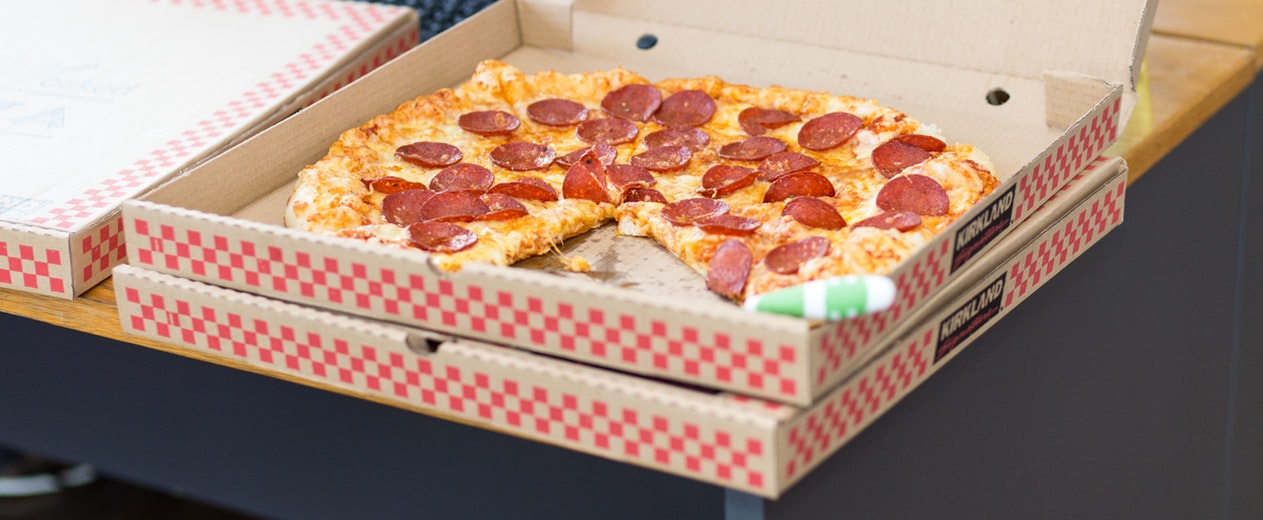How bad are greasy pizza boxes for recycling?

When it comes to recycling, greasy pizza boxes are bad. Seriously bad.
To understand why, let’s take a look at how paper and cardboard recycling works.
The heat processes required for glass, metal or plastic recycling can burn off small amounts of food residue. So unless there is an excessive amount of food left on recyclables, your glass, metal and plastic materials will come out just fine.
But paper recycling is another story. Because paper doesn’t get heated during its recycling process, grease and oil combine with the pulp, which can ruin the batch. Once your paper and cardboard are sorted into grades and types, they move on to the paper mill. They may spend weeks in storage, where food particles and grease in a batch can turn rancid and attract insects or animals.
After that, they are washed with soapy water, and sometimes chemicals, to remove inks, plastic film, staples and glue. The batch is then sent to a large receptacle where it’s mixed with water to create a slurry.
That’s where your greasy pizza box—well, any paper product that’s greasy—gunks up the works. Even though it’s been through a soapy bath, if you’ve ever washed something full of grease or oil, you know that it takes quite a bit of effort and soap to remove it completely.
Once in the slurry, the remaining oil floats to the top. It becomes impossible to separate the oil from the paper fibers at this point. Depending on what type of paper the mill was going to make and how much contamination is occurring, the entire batch may be ruined.
To avoid contaminating clean materials, when in doubt, cut off the clean tops of your pizza boxes and send the bottoms to the trash.
Aspirational Recycling
Many people have the best of intentions when they toss non-recyclables into their curbside bins. Because they want an item to be recyclable, they “sneak” it in, even when they know they aren’t supposed to. We call this wish-cycling.
When this happens, their unwanted item often causes problems. It may be caught early in the process, pulled out and thrown in the trash, where it should have gone in the first place. Or it may make it through and contaminate an entire batch of clean materials.
Bottom Line
Grease and oil are two of the worst contaminants in paper recycling, and greasy pizza boxes are one of the biggest culprits. Check with your local recycling program to find out its policy. Although most don’t allow them, some allow boxes with minimal grease to be recycled and others allow them to be put in with compost. When in doubt, just cut off the greasy parts, throw them in the trash and recycle the rest. Also, if your city’s a member of our network, you can download the Recycle Coach app for free. We’ll show you what is and isn’t recyclable in your community.
4 Comments
Comments are closed.
Alice Corey
October 15, 2021 at 8:53 pmHow clean do black plastic plant containers need to be to recycle in yellow recycle bin?
April
October 19, 2021 at 7:18 amAny recyclable container must be empty and clean. If it’s for plants, then I would suggest wiping the dirt out with a cloth. Be care though because many recycling programs do not accept black plastic. Check with your local program to see if that item is accepted.
Jake
January 11, 2023 at 8:16 amThere is a scientific study that was conducted that almost completely debunks this article.
https://www.greenbiz.com/article/grease-and-cheese-study-proved-pizza-box-recyclability
April
January 23, 2023 at 6:48 amWow! It’s always great to hear when materials that were not accepted before now can be accepted for recycling! This is a very interesting study. As your article states though, only 21% of municipalities explicitly state that they accept pizza boxes. So, residents should still check with their local recycling program to see if they accept this item before just throwing it in the bin. Differences in machinery and recycling feed buyers in the area are two main contributors to why a facility would accept or deny any given item, so while your article does show hope that these will eventually be universally accepted, it does not mean residents should throw greasy pizza boxes in their bins because they hope they can be recycled. Always check your specific program first to avoid recycling contamination at your facility. We do recommend to remove the greasy part and recycle the clean part of the box at least if your facility doesn’t accept this item yet.